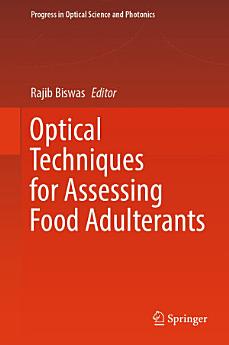Optical Techniques for Assessing Food Adulterants
About this ebook
In recent years, optical probes have emerged as powerful tools for detecting food adulterants. Optical probes such as colorimetric probe, optical fiber probes, LSPR probes as well as SERS enabled probes are useful tools for detecting food adulteration in a fast and non-destructive way. Optical probes can measure various properties of food products, such as color, texture, moisture, composition, and authenticity, by using different types of light sources and detectors. Optical probes can also be integrated with other sensors, such as microfluidic devices, biosensors, or spectroscopic techniques, to enhance their sensitivity and specificity. Optical probes have several advantages over conventional methods of food analysis, such as portability, flexibility, low cost, and real-time measurement. Therefore, optical probes are a promising technology for the detection of food adulteration in various applications.
About the author
Dr. Rajib Biswas pursued his doctoral research in Northeast Institute of Science and Technology, India. He joined as a faculty in Department of Physics, Tezpur University. Being in academics, he is actively engaged in applied photonics research. He is an emeritus member of Optical Society of America. His research interests are in the areas of sensing and instrumentation, design of facile probes as well as assays for various applications, TMDCs along with their interaction mechanism at molecular level.




